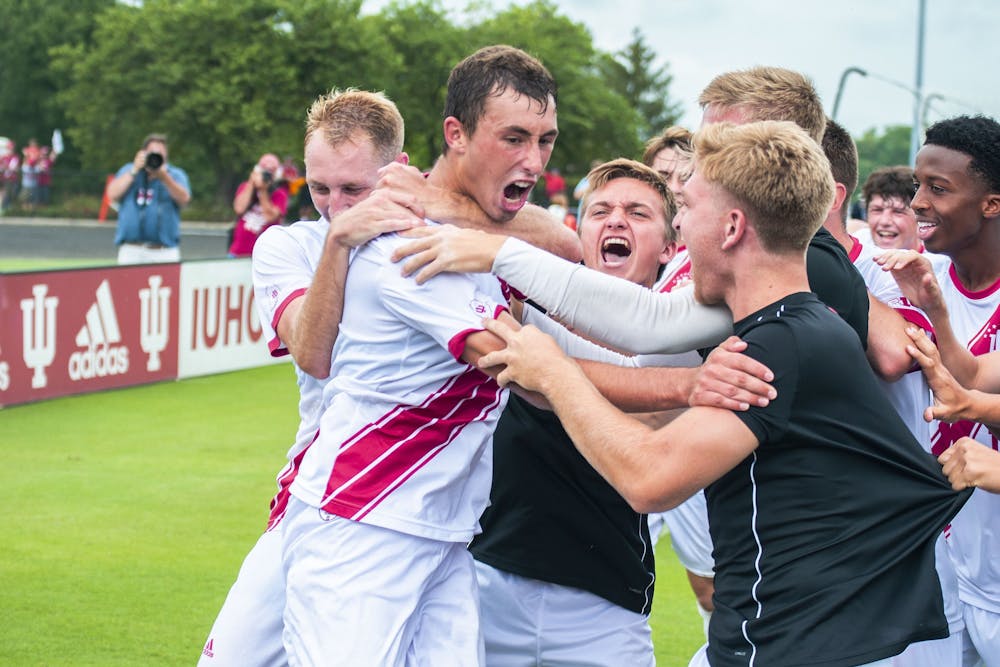Joe Schmidt was riding a high on the first day of training for IU men’s soccer.
By the end of the day on Aug. 11, the junior midfielder and the rest of the team found out there would be no fall season.
Now the Hoosiers, who fell in a stunning loss to the University of California, Santa Barbara in the Sweet 16 last December, are looking ahead to compete for a title in a potential spring season.
Preparing for a spring season
Schmidt said the team is acting like they’re still preparing for a fall opponent, just a delayed one.
“Everyone’s mindset each year is you’re working towards December and a national championship,” senior Spencer Glass said. “This year you just have to flip a switch and we’re gonna work harder a little longer for May.”
While head coach Todd Yeagley said he hasn’t received any final word on the spring, he said IU’s natural competitiveness will give it the motivation it needs with a spring season on the horizon.
“Our guys are ready,” Yeagley said. “They’re motivated to win.”
Coming out of quarantine, Glass said the team lacked some ability in lateral soccer-style movements despite being fit overall. He credited Tom Morris, assistant athletic director for athletic performance, for pushing the players to stay fit while protecting the legs.
Now the Hoosiers are back doing offseason training and experiencing a new routine.
“Most preseasons would be faster paced, maybe a week of training and then we get into exhibition games,” Schmidt said.
Schmidt said training will likely be six times a week with one off day, simulating a game environment as much as possible.
A spring season might also give the Hoosiers a test run of what the new academic-year season could look like.
The NCAA was supposed to vote in April on making Division I men’s soccer a year-round sport, with 14 fall matches and nine spring competitions beginning in 2022. The vote was tabled as a result of the COVID-19 pandemic.
Yeagley is a supporter of the plan proposed by Maryland coach Sasho Cirovski, who argued the benefits of a year long season on players’ mental and physical health, according to the Philadelphia Inquirer.
Unveiling the Tardy Center
After not being allowed to practice until July, then working their way into playing shape before the season was abruptly canceled, the unveiling of the Tardy Center brought new energy to a team that needed something positive.
“The smiles on the guys’ faces when they toured the facility for the first time said it all,” Yeagley said. “There’s been a lot of disappointment in the last 4-5 months.”
Yeagley thanked alumni and friends of the program for helping bring the Tardy Center to reality.
“It gives us a home, one location for us now,” Yeagley said. “We can be in one spot.”
Yeagley said for the players who arrived in July to begin workouts and saw the construction of the new center play out, he was happy with the payoff.
“I thought everyone did a great job of minimizing the exposure of the facility so it was really a surprise,” Yeagley said. “It has been a long time in the workings for this.”
Keeping Engaged
In a spring where nothing was normal, Yeagley had to get creative to bring the team together.
Quarantine meant that IU was spread out across the country and unable to meet in person, so Yeagley, like nearly every office and workspace across the country, turned to Zoom.
“We try to stay really present,” Yeagley said. “We had a really good time with them interactively through the whole spring.”
Yeagley said the team played Kahoot on video calls and dug deep on personalities and what players think are important. Former players also joined the calls and gave the team lessons on struggles they’ve dealt with.
Now with additional free time in the fall that would normally be filled with practice and training, Schmidt and a few teammates have taken time to play for Bass FC — the name of their bass fishing group.
“Those are the more country boys,” Schmidt said. “Then we got the country club boys, who go golfing.”
Yeagley said the team’s challenges helped keep a competitive spirit, but a fall where the athletes remain together will allow them to move forward as a group.
“Now that we’re back with them and they’re here, that's where you ultimately create the bonds that are lasting,” Yeagley said. “Anyone who tells you otherwise hasn’t coached.”




